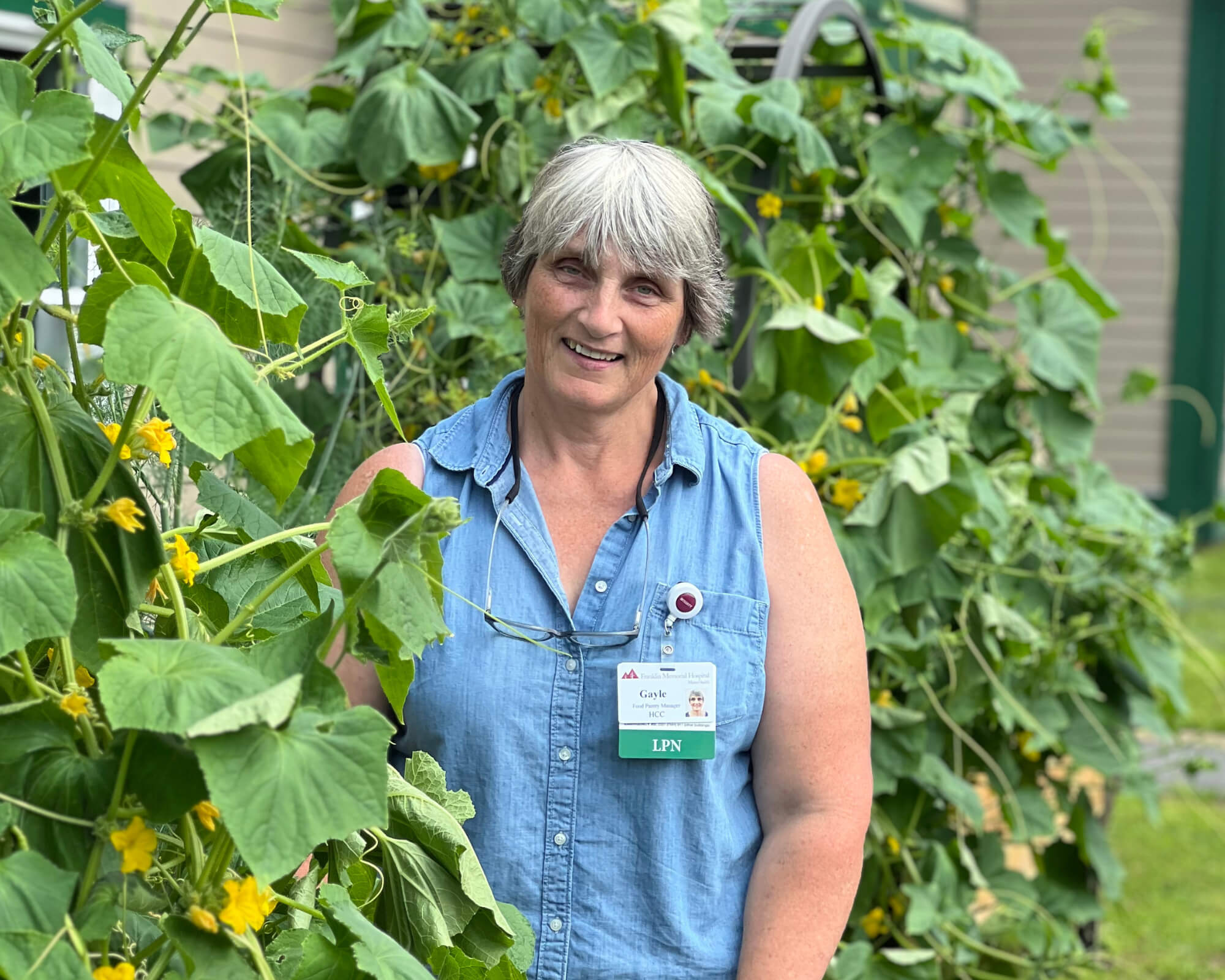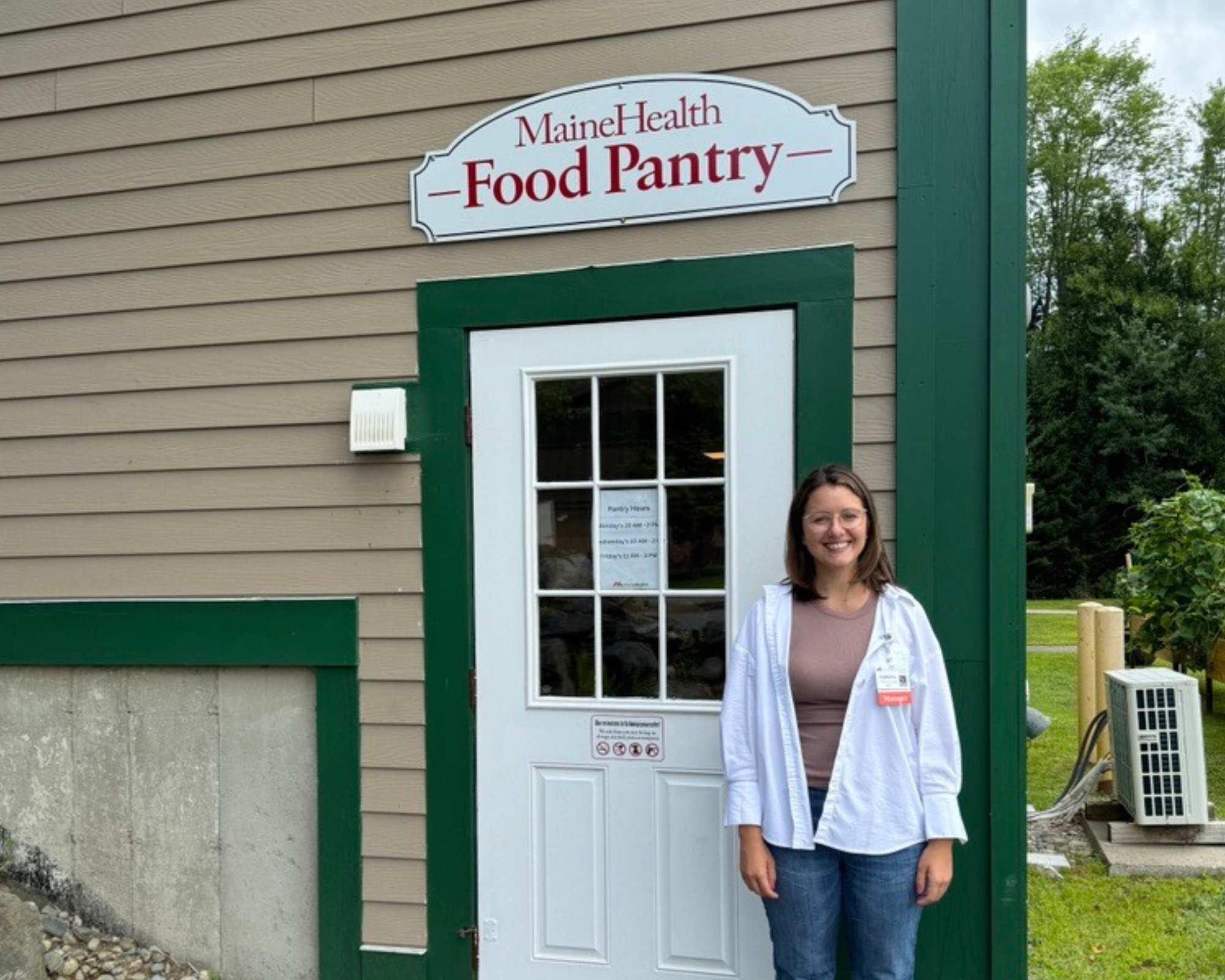Stories from the Road: MaineHealth Food Pantry at Franklin
We’re excited to highlight some of our non-traditional food bank partnerships, including those located right in healthcare offices and hospitals. These unique partnerships are transforming how we address food insecurity.
What is the Food Bank’s Community Health and Hunger Program?
Food insecurity impacts millions of individuals and families across the United States, nearly 180,000 Mainers. It’s associated with inadequate nutrition, higher rates of chronic disease, and is a catalyst for various health issues – from malnutrition to obesity. Significant disparities exist across racial and ethnic groups. Adults in households with very low food security are more likely to be diagnosed with chronic conditions like hypertension, coronary heart disease, hepatitis, or stroke than adults in food-secure households.
Good Shepherd Food Bank’s Community Health and Hunger Program is committed to not only addressing food insecurity but also its detrimental health effects. The program is a multifaceted initiative that recognizes the interconnectedness of food security and health. This program takes a proactive stance by offering technical training for medical staff to screen for food insecurity in patients, ensuring that no one’s challenges go unnoticed.
The Food Bank recognizes that partnering with healthcare organizations across the state is crucial to improve food security, promote wellness, and advance health equity. Our unique partnership equips healthcare providers with resources to guide patients in finding the food they need in their local area. Patients are empowered with knowledge, which is a powerful tool for breaking the cycle of food insecurity. Including several pantries located in medical offices, so patients receive food at their visit when needed.
One of the most impactful aspects of the program is the provision of nutritious grocery items for patients in immediate need. Those identified as food-insecure can leave their clinical visit with a bag of nutritious food, at no cost. This immediate relief not only addresses their current hunger but also contributes to their overall health and well-being.


Visiting the MaineHealth Food Pantry at Franklin
One of our nearly 200 Community Health and Hunger Program partners is the MaineHealth Food Pantry at Franklin in Farmington, Maine. The Food Pantry at Franklin works with referred MaineHealth patients and anyone else who is experiencing food insecurity in the local community. The pantry is welcoming and confidential, providing a variety of free, fresh, frozen, and shelf-stable food that supports health and well-being in Franklin County. They also offer infant formula, baby diapers, COVID-19 at-home testing kits, and personal hygiene items such as soap, shampoo, and toothpaste.
Though they do grow some of their own produce in raised beds at their Harvesting Hope Garden, most of the food at the pantry comes from Good Shepherd Food Bank, including direct deliveries from a Mainers Feeding Mainers (MFM) program partner, Rustic Roots. Farmer Erica Emery recently partnered with the Food Bank to become an MFM partner in 2024. Produce includes peppers, carrots, eggplant, lettuce, onions, radishes, summer squash, zucchini, Swiss chard and tomatoes. “Gayle at MaineHealth puts all our produce to good use. Nothing ever goes to waste. We enjoy working with the pantry,” said Erica Emery.
The pantry’s welcoming environment is evident from the moment you step inside. On our visit we met with both Gayle and Sabrina, two MaineHealth staff members who work full-time at the pantry. Gayle is typically right up front ready to welcome anyone who visits and often knows people by name. The pantry operates with a dedicated team of three full-time Healthy Eating and Active Living (HEAL) employees and two per diem staff members. Sabrina, who joined the pantry in November 2023, and Gayle, who has been with the pantry for about a year, are both passionate about their roles. Sabrina highlighted the pantry’s core mission: “This is a supplemental food pantry. We encourage them to check here first then buy everything else they need at the store.”
They manage approximately 700 visits a month, with 5-8 new patients each distribution. On Fridays, when the Food Bank delivery arrives, Sabrina described it as an “all-hands-on-deck situation.” They receive the delivery from a Food Bank driver and work quickly to unpack pallets and stock the shelves. “We look forward to the Food Bank delivery every Friday. Matt is our driver and he’s amazing,” Sabrina said.
The pantry also hosts special produce pop-up days, usually on Saturdays once a year, which serve around 300 visitors. It’s a community event that brings people together and spreads the word about the pantry’s offerings.
What truly stands out is the pantry’s Food as Medicine (FAM) program. This initiative is designed for MaineHealth primary care patients aged 18 or older living in Greater Franklin County who have chronic health conditions such as type 2 diabetes, obesity, high cholesterol, or high blood pressure. Sabrina explained the program’s philosophy, “Food is Medicine teaches participants that eating healthy foods can better manage your condition and improve quality of life.”
What the program includes:
• Free healthy food – 10 meals each week
• Healthy cooking classes, recipes, and menu planning with a registered dietitian
• Connection with and support from others in your community
• Resources to help manage health conditions
The impact of the program is profound. It’s not just about the food; it’s about education, support, and building a healthier community. Gayle, who leads many of the cooking classes, shared her enthusiasm: “I love teaching the classes. In-person classes build such bonds. I enjoy showing people what to do with food and how to garden.”
One touching story from the Food is Medicine program involves a participant who had to leave class due to surgery. The community’s response was heartwarming; classmates organized a meal train using the recipes they were learning. This act of kindness exemplifies the program’s spirit of mutual support and solidarity.
Testimonials from participants reflect the program’s success:
• “FAM has great leaders. I enjoy the class, love the other members. I like trying new foods, foods that I never would have tried before. For example, lentils and black beans. I like the recipe assortment and the fact that we get to sample the recipe each week. It is so helpful to be sent home with the ingredients to make the recipe. Overall, I have really enjoyed the class.”
• “Gayle is knowledgeable and a great instructor.”
• “She is also a good cook…so move over Martha Stewart.”
• “This should be introduced to many facilities with medical professionals recommending it.”
• “I look forward to this class every week! I am very impressed!”
The MaineHealth Food Pantry at Franklin is more than a place to get food—it’s a pantry where people learn, grow, and support each other. As Sabrina put it, “Food brings everyone together.”
The Community Health and Hunger Program, in collaboration with organizations like MaineHealth Food Pantry at Franklin, is a testament to the transformative impact that community initiatives can have on addressing food insecurity and its health consequences. As the statistics show, food insecurity is not merely a matter of hunger; it’s a health crisis with far-reaching implications. By training medical staff, providing resources to patients, and offering nutritious groceries at no cost, this program makes a tangible difference in the lives of those in need. Together, we can break the cycle of food insecurity and the associated chronic health conditions, striving for a healthier, more equitable future.



